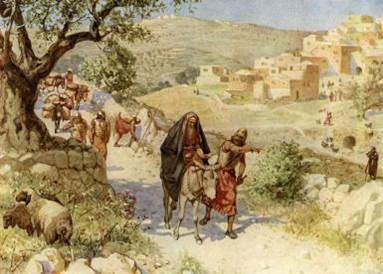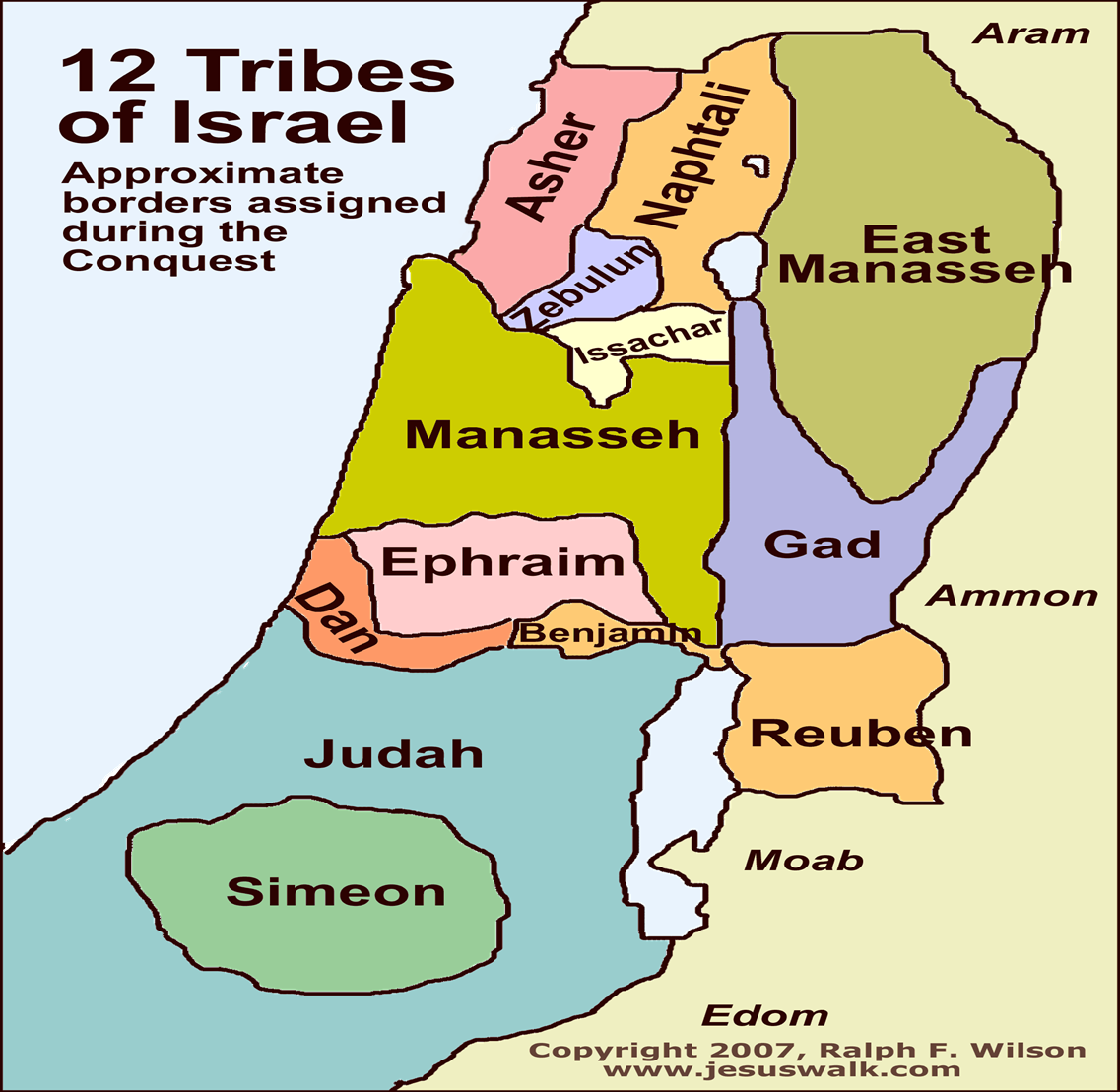Judges 4-5. Deborah's song, part 4.
Title: Judges 4-5. Deborah's song, part 4.
Announcementsopening prayer:
Starting in verse 9 Deborah's song turned from the contemplation of the deep degradation of Israel to the glorious change which took place as soon as she appeared
Jdg 5:9 " My heart goes out to the commanders of Israel, The volunteers among the people; Bless the Lord!
Jdg 5:10 " You who ride on white donkeys, You who sit on rich carpets, And you who travel on the road — sing!
Jdg 5:11 "At the sound of those who divide flocks among the watering places, There they shall recount the righteous deeds of the Lord, The righteous deeds for His peasantry in Israel. Then the people of the Lord went down to the gates.
Verse 10 issues the call to all classes of Israelite society. The ones who travel on white donkeys and sit on rich carpets are the wealthy class and those travel on the road (walk by the way) are the poor classes.
All classes of the people are addressed, as enjoying the fruits of the victory that had been obtained: the upper classes, who ride upon their costly animals; the rich resting at home upon their splendid carpets; and the poor travelers, who can now go quietly along the high-road again without fear of interruption from the foe.
In verse 3 she called upon the Canaanite kings to hear and to fear, but now she calls upon all in Israel to hear and to "sing" which word is to meditate and reflect upon all that had occurred.
Jdg 5:11 "At the sound of those who divide flocks among the watering places, There they shall recount the righteous deeds of the Lord, The righteous deeds for His peasantry in Israel. Then the people of the Lord went down to the gates.
First we need to correct the translation. The first line doesn't possess a verb and so it has been translated in varying ways. Flocks are not mentioned, but the NASB has taken the chatsats to mean those who divide the booty and so divide flocks that were the spoils of winning the battle, but the word here simply refers to archers, which being Israel's main weapon of war, indicated the warriors. So we have the sound of the archers or the sound of the warriors, but the Hebrew preposition indicates that the place indicated is away from that sound and so we would translate it:
"Far from the noise of archers, in the places of drawing water." The warriors returned home and told of the mighty acts of the Lord on the battlefield to all the people.
The watering places were places of gathering much like the gates of the cities. The people would go to the watering places and relate all news to one another as they watered the flocks and herds. The warriors had returned to their villages and told their families and neighbors of their eye-witness accounts of the mighty, righteous acts of Jehovah in the Jezreel valley and this news would travel from place to place and was recounted time and time again in the public places.
No longer were the people restricted in their traveling on the main highways and trading routes. The oppression was lifted, and if anyone has felt oppression for a long time, when it is lifted, the whole world seems different, the air cleaner and lighter, the sun brighter, the water sweeter. All could feel the absence of tyranny and the presence of freedom and how this came to be through the righteous acts of the Lord was related one to another all over the nation.
It was the first time of peace in twenty years, when the warriors were again occupied with their civil and domestic affairs, and no one could mistake that Baal did not deliver, but Jehovah had with resounding force.
How could they ever go back to idolatry? The next generation were told but they did not know, and again the dreaded cycle begins.
Jdg 5:11 "At the sound of those who divide flocks among the watering places, There they shall recount the righteous deeds of the Lord, The righteous deeds for His peasantry in Israel. Then the people of the Lord went down to the gates.

At least for a time the righteous acts of God will be related to all the people, rich and poor and they will remember that God defeated Israel's enemies and set them free from the oppression of the foreigner and that He did it for them, for all of them and the result will be that they will find strength and bravery where before there was fear. Going down to the gates is meeting any enemy that may come. Whereas before there was no one to take up arms and fight in the bravery that comes from faith in Jehovah to deliver, now they will go boldly to the gates.
We have the same word from vs. 7 repeated here and translated peasantry.
"peasantry" - perazown = the country covered with open towns and villages, together with their inhabitants, whom Jehovah had delivered from the hostile oppression that had rested upon them.
The Lord had smashed Sisera and so all the people in their un-walled towns and tiny villages openly traveled and traded and spoke freely to one another. They worked their fields in peace and not fear of invasion and theft and abuse. No longer do they have to look anxiously around for Canaanite invaders or nervously listen for sound of horses and their Canaanite riders drawing closer. They could work through the day, rest for lunch in peace, travel home after the day's work without fear along the way and knowing that their homes were safe and just as they left them. They gathered together openly without fear and all due to Jehovah's righteous deeds for them.
Jdg 5:11 "At the sound of those who divide flocks among the watering places, There they shall recount the righteous deeds of the Lord, The righteous deeds for His peasantry in Israel. Then the people of the Lord went down to the gates.
God earned the victory over Sisera. After that victory the people of the Lord went down again to their gates, from the mountains and hiding-places in which they had taken refuge from their foes.
If only the next generation would heed this one, then they could also live in peace and freedom.
Verse 12 forms the introduction to the second part of the song.
Part 2: an explanation of the conflict and the victory.
Jdg 5:12 "Awake, awake, Deborah; Awake, awake, sing a song! Arise, Barak, and take away your captives, O son of Abinoam.
Jdg 5:13 "Then survivors came down to the nobles; The people of the Lord came down to me as warriors.
The word translated "survivors" in the NASB is better translated as "remnant." This is a heralding of the warriors who came down from the mountains in order to fight. Obviously they are alive, Deborah wouldn't be singing about that. But as we will see, not everyone fought. Israel did not rise up as one nation against the enemy. So it is a "remnant" of nobles that came down from the hills, from where they were hiding before Deborah, and now are willing to fight and lead.
"There came down a remnant of nobles. Among the brave Jehovah Himself went against the foe." (corrected translation)
Looking back to the commencement of the battle, the poetess describes the streaming of the brave men of the nation down from the mountains, to fight the enemy with Barak and Deborah in the valley of Jezreel; though the whole nation did not raise as one man against its oppressors, but only a remnant of the noble and brave in the nation, with whom Jehovah went into the battle.
It is Jehovah who summons the Canaanites to war.
Of those who came out of their hiding places in the hills of their respective territories, the brave men from the tribes that joined the battle are celebrated.
Isn't it interesting that God gave Israel a land where there are wide, sweeping plains in which to openly live as well as isolated hills and mountains in which to hide.
According to the promise of Jehovah Israel would never need to hide from anyone, but if they chose to reject the Lord so as to bring great oppression upon themselves, the hiding places were provided. The mountains gave an opportunity to show cowardice and was also a place to protect the cowards from complete destruction.
Jdg 5:14 "From Ephraim those whose root is in Amalek came down, Following you, Benjamin, with your peoples; From Machir commanders came down, And from Zebulun those who wield the staff of office.
There came fighting men; not the whole tribe, but only nobles or brave men from the tribe-territory in Ephraim [Deb's tribe] that had formally been inhabited by the Amalekites.

Benjamin is just south of Ephraim and so they are seen as following Ephraim north to the plain of Jezreel.
Machir, only son of Manasseh, refers to Western Manasseh, whereas Gilead, Manasseh's grandson, is used to refer to Eastern Manasseh.
This is the means that the Bible uses to distinguish the two. Though they are of the same tribe, the Jordan river divided their territories, and although they should have stayed unified, the two became like separate tribes.
Zebulun is then mentioned as also joining the war, specifically their leaders, "those who wield the staff of office."